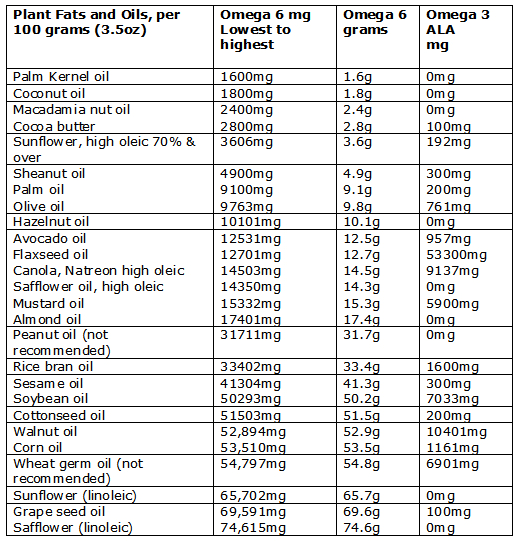 By now, most of us know we should include healthy fats in our diet, but do we understand why, or know which fats are best?
By now, most of us know we should include healthy fats in our diet, but do we understand why, or know which fats are best?
Not all fats are created equal, and some are definitely more essential to good health than others. Identifying which fats we should include in our diet can be a challenge, despite all the information available on the subject. Too much information can be confusing and overwhelming, so I’m going to attempt to break it down, with the hope you’ll be able to make informed, educated choices on which fat and oil to use. Stay with me!
Fatty acids are the building blocks of fat and oil.
Essential fatty acids, better known as EFAs, are fatty acids (fats) the body can not make, yet needs for optimal health and bodily functions. Another name for EFAs is vitamin F or polyunsaturates. Because the body can’t make these important EFAs, we must get them through foods that contain them or by taking oil supplements.
Every living cell in the body needs essential fatty acids. Their importance has been underestimated until recent years, and it’s now understood how critical they are for sustaining life. EFAs play a major role in rebuilding and producing new cells; a process that happens 24/7, and is vital for our survival. That reason alone should make you go get some EFAs fast! Another remarkable task EFAs take part in is the production of prostaglandins; hormone-like substances that regulate various body functions and processes. EFAs also aid nerve impulses in the brain, and are needed for normal brain development and function. We need these fats for healthy skin and hair; cardiovascular health: maintaining proper blood pressure, cholesterol and triglycerides; reducing inflammation that causes many diseases, including arthritis; preventing cancer; immune function; mental stability; reduction of blood clot formation and countless other reasons. From head to toe, our bodies need these invaluable fats to stay alive.
There are two basic or main categories of essential fatty acids that are based on their chemical makeup: omega-3 and omega-6. There is also omega-9, which is considered an EFA; however the body is capable of making it. Still, acquiring omega-9 from food is very beneficial for the body. It’s safe to say that if a food containing omega fats does not contain omega-3, then it has omega-6 and often some omega-9 in it, as well.
Fats and oils are classified according to which omegas they contain.
Fish oil, for instance, only contains omega-3 EFAs, so it’s known as an omega -3 fat. Soy oil contains omega-6 EFAs, so it’s known as an omega-6 fat. Many foods have omega oils in them; each having their own combination and amount. Fish, nuts and seeds are amount the foods richest in omega 3, 6, and 9 essential fatty acids – so, it’s wise to consume these foods, or their oils, on a daily basis. Are you still with me?
The body needs up to six times more omega-3 than omega-6 fats; making omega-3 a priority. Unfortunately, it’s more difficult meeting our omega-3 needs because more foods contain omega-6. Unless you’re going to eat certain types of fatty fish (salmon, mackerel, tuna, sardines, fresh water trout, etc.) several times a week, the use of omega-3 oil supplements is a good idea. The typical western diet is so heavily inundated with omega-6 oils; many people choose to only take omega-3 supplements, since their omega-6 needs are more than met through food. As far as I know, we can safely consume an unlimited amount of omega-3s – the more the merrier! However, be aware that not all omega-3s are the same. Is this getting confusing?
It’s true not all omega-3s are the same.
There are three different types of omega -3: ALA, DHA and EPA. Fish and seaweed/algae are the only foods that naturally contain DHA and EPA. (Many foods, like eggs, that don’t naturally contain omega-3’s DHA and EPA, are now being fortified with these fats… or so we’re told!) Other omega-3 foods naturally contain only ALA. The body converts ALA into EPA and DHA (how’s that for proof of their importance?!), but the conversion rate is typically very low, so don’t rely on foods containing ALA to provide you with the proper amounts of DHA and EPA – go directly to the source… FISH! ALA, even if not converted, is very beneficial, so try to include foods (flaxseed, flaxseed oil, walnuts, Brazil nuts, avocadoes, etc.) containing ALA in your diet, also.
Fish oil’s omega-3 contains DHA and EPA; two components whose contribution to brain, heart and joint health have everyone buzzing and eating salmon or popping fish oil supplements. The reason this oil is so important is because DHA is the brain’s favorite EFA. The brain is 60% fat. Wow, that’s a lot, and gives new meaning to the term “fat head”! Sorry, I digressed. The brain needs fat in order to function properly. Without enough of the right fat, the brain is set up for all kinds of imbalances to take place, such as memory loss, inability to concentrate, depression and other mental illnesses. Let me put it another way, which I know you’ll understand… depriving the brain of necessary fat (DHA) is like driving your car without oil in the engine. Eventually, the engine won’t perform properly and will seize up. It’s really that simple. Psychiatrists now promote the use of fish oil for mental health… which says volumes. So, although omega-3s are in other foods and oils, be sure to get some fish, fish oil, krill oil, seaweed or algae into you, since the other omega-3 foods don’t contain DHA.
EPA has been recognized for its anti-inflammatory benefits and is very effective for arthritis and cardiovascular health. Diabetics using insulin should always speak with their doctor and monitor blood sugar if using fish oil, since it’s capable of affecting blood sugar and the amount of insulin needed.
Okay, the bottom line is this …
We need certain fats to live our best life, and these fats must be supplied by our diet. EFA fats are typically in the form of oil, and are found in certain fatty or oily foods. I think I’ve bored you with enough science, so without further ado, the following chart is a list of the most commonly used oils and their omega values. You’ll see the omega 3 and 6 comparisons; which is a great guideline for making appropriate diet choices. Remember, these oils only contain omega-3 ALA, since they are from plant sources and not fish or seaweed.
Guidelines for taking oil supplements instead of eating omega rich foods:
- Fish are contaminated with ocean toxins and mercury. The larger the fish, the more contaminated. The reason is because of the food chain: large fish eat smaller fish, which eat smaller fish and so on… all containing mercury. That’s why tuna, for instance, has so much mercury in it. Those big tunas have been eating lots of small fish for a long time; resulting in high levels of mercury by the time they end up on our plate. So, in order to avoid all the mercury and other toxins in fish oil supplements, buy a reputable brand that advertises the oil’s been cleaned through “molecular distillation”. Supposedly, it cleans the oil better than any other process… according to what I’ve researched and what my mother’s told me. (Thanks, mom… she’s big into supplements.)
- Any loose, bottled oil: fish, flax, nut, and unprocessed vegetable oils – avocado, olive oil, macadamia, etc. – need to be refrigerated. If not, they’ll go rancid quickly. Oils should be used within several weeks once the bottle is opened, so they’re fresh when used. The last thing you want to put in your body is rancid oil. It’s extremely unhealthy and carcinogenic.
- EFA oil capsules or softgels of any kind, including fish, do not have to be refrigerated, but can be. They have a shelf life of six months once the jar is opened, and should be used within that time. The reason they don’t need refrigeration is because the gelatin capsule protects them from air, which causes oil to oxidize. Keep in mind, any expiration date on the jar is based on the supplement’s expiration ONLY if the bottle hasn’t been opened. This rule applies to all supplements.
- How much oil is enough? According to Udo, the “Father of Fat”, one tablespoon of oil per 50 pounds of body weight is ideal. So, if you weigh 200 pounds, you should consume 4 tablespoons of oil a day. Another rule of thumb to follow is your omega consumption (oil) should be 10 to 20% of your total daily caloric intake.
- If you have trouble swallowing oil directly off a spoon, put it in protein shakes, salads or other foods. Be sure not to cook with oils such as flax and walnut, which are high in omega-3s because their EFAs will be destroyed. Heat is the enemy; causing the formation of dangerous free radicals, which cause disease.
- Always take any oil supplement – softgels or liquid – with food. They mix with the food; resulting in better absorption.
Essential fatty acids are just that – essential and necessary. If you’re not already getting some from your diet, please do. The human body depends on them for feeling and looking its best… which will only add to your alpha image!
by Aaron Marino













